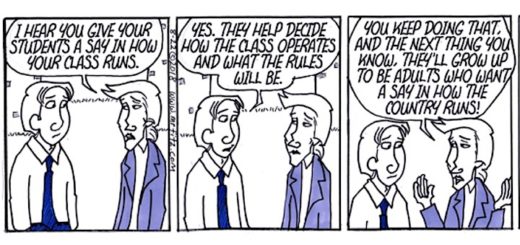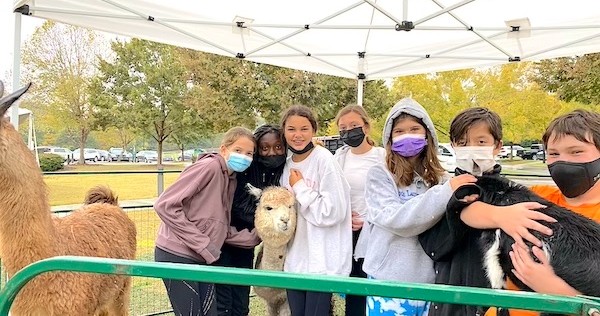21 Deep Dives Good for Summer PD Reading
“No way I have time for that!” Did the sheer exhaustion of teaching in 2021-22 cause you to take a pass on some good but long MiddleWeb articles? Here are 18 insightful posts you might want to look over in the calm before the next storm.
Well, the next storm came with all the expected sound and fury – and for many, even more weariness and low spirits. Now here we are in the summer of 2022 sharing a second set of 21 excellent Deep PD Dives you might have missed – all published during the Delta/Omicron/Variants blizzard of the past 12 months.
We’ve curated this cross-curricular collection of longer posts from our database of top articles since 7/1/21. Most are not EPIC – just long enough to be thorough, informative and full of tips!
Help Students Become Adept Media Evaluators
Students are constant targets of advertisers and influencers, writes author–consultant Frank Baker. Introduce kids to seven key media literacy questions that can boost their critical thinking skills and get them in the habit of always asking “What’s really going on?”
25 Words That Trigger Student Understanding
Brain and learning expert Marilee Sprenger highlights the 25 most high-frequency words for learners in the English language to focus upon. “I call these words ‘essential’ because knowing and using them can boost academic success and lifelong learning.” Are they on your vocab list?
Literacy Activities That Boost Content Learning
In classes like social studies and science, students are expected to do complex nonfiction reading. How can we ensure they’ll process and retain the content for future use? History/ELA teacher Megan Kelly shares fun activities to help kids think more deeply about information text.
Sketchnotes Help Kids Grow Their Mindsets
Sketchnotes give kids the chance to express themselves with an assignment that falls in the gray area between ‘correct’ and ‘incorrect.’ Sixth grade teacher Kelly Owens explains how she and her co-teaching colleague use sketchnoting as a technique to promote growth mindset.
Tips for Integrating SEL in 5 Middle Level Subjects
To help middle graders learn and practice social and emotional skills, teacher and Director of Studies Kasey Short offers ways to incorporate SEL across the content areas, from considering the motivations of historical figures to creating reality-based math word problems.
Helping History Students Think for Themselves
Jennifer Ingold wants her history students to make the connection between primary-source research and preparation for informed and civil disagreements. Learn about her MLK historical scene investigation activity and a virtual Black History Symposium among students in NY and FL.
Spark Math Engagement with Daily Warm-Ups
If you’re looking for a way to engage your students in deep mathematical thinking as soon as they walk into class, give math warm-ups a try. Middle grades teacher Mona Iehl lays out the elements of eye-catching warm-ups and how to make them work for your kids.
5 Principles of Culturally Responsive Teaching
Culturally Responsive Teaching is not a fad. It’s not one more thing we have to do for multilinguals, writes Tan Huynh. It’s a way of designing instruction for ML/EL/ESL learners that’s grounded in the assets of students, their families, and their communities.
My Radical Approach to Class Management
“My collaborative approach to discipline may sound too good to be true. But it’s still working, eight years into the experiment,” writes teacher and cartoonist David Finkle. “Some classes respond immediately; some need time to adjust to the paradigm shift. But in the end, it nearly always works.”
5 Kinds of Nonfiction: A New Way of Thinking
Teachers in science and all across the curriculum will welcome this post by nonfiction expert Marlene Correia and Melissa Stewart, author of 180+ nonfiction books for kids. Learn why the five categories of children’s nonfiction they identify not only excite and engage but are what many students say they want to read most.
Student Book Talks Help Motivate Readers
We often turn to friends when we’re looking for new books to read. The same is true for students. Making book talks a regular part of your classroom gives kids a platform to recommend books they love and want to share. Lynne Dorfman and Brenda Krupp offer helpful tips and tools.
How We Can Assure Rigor in Our Lessons
What does instructional rigor look like in the middle school classroom? Teaching consultant and bestselling author Barbara Blackburn offers examples of lessons that reach for the top of Bloom’s and DoK – in social studies, math, electives, the arts, English/ELA, and science.
Flipping over Flippity: Flashcards and More
Kathie Palmieri likes the free teacher-owned Flippity site, offering engaging teaching tools in all subject areas. She shows how to easily create multimedia flashcards, involve classes in randomly choosing partners, and make interactive spelling lists tailored to students.
The 3 Top Take-Aways from a GRR Master Class
Letting go is messy! As Sunday Cummins and Julie Webb wrap up a 10-part exploration of the gradual release of responsibility, they encourage teachers to ensure kids participate actively in every phase of the release process as they observe them closely, remain nimble, and practice flexibility. Included: Links by title to each article in this GRR master class!
Leadership: Listening to Others in Volatile Times
Active listening is a key skill for school leaders, especially when faced with the need to mediate complex or volatile issues. Consultants Ron Williamson and Barbara Blackburn describe 5 barriers to effective listening and 10 tips to help every leader become more successful.
Ready STEM Students for a Future of Creativity
Shifting our STEM teaching approach to align with current workforce needs means broadening our thinking about the design process, writes Anne Jolly. That includes helping students work together to build the skills of empathy and creativity that lead to innovative solutions.
Create a Wellness Fair to Counter Kids’ Stress
Kasey Short shows how your middle grades school can create a Wellness Fair to highlight that stress is normal, showcase that mental health is a priority, and provide students an opportunity to learn and practice a variety of coping skills. And kids will have fun doing it!
2 Key Math Strategies for Students with Disabilities
Bradley Witzel and Barbara Blackburn share research-supported strategies proven effective for students with special needs and mathematics challenges. They model the concrete-visual-abstract sequence of instruction (CVA) and schema-based instruction (SBI) for word problems.
Rubrics: 5 Go-to Ways to Engage Students
The more students interact with the rubric, the more ownership they take over it, writes Megan Kelly. Once they feel empowered by the rubric, they can use it as a tool to accomplish their goals rather than a means of judgment, putting them on the same team as the teacher.
Can a Principal Also Be an Instructional Coach?
While supervision has a place in schools, the purpose is not to improve instruction, writes principal and author Matt Renwick. Leading like a coach supports teaching and learning, and principals will be in a prime position to do this vital work if they develop three coaching skills.
‘What Do I Get If I Do It?’ The Cost of Rewards
Do rewards help kids learn better? Motivation expert Dr. Debbie Silver argues instead for the effective use of positive, constructive feedback as the best means for fostering creativity, active involvement and intrinsic motivation. Included: How to make feedback effective.
School Libraries Build Lifelong Reading Skills
Katie Durkin’s 7th graders are once again able to visit the school library, and she has three goals for them: tap into the expertise of librarians; learn how to preview a fiction or nonfiction text; and grow the skills to become expert book hunters. Don’t miss the infographic!
BONUS!
Our 2022 Winter Book Review Festival
MiddleWeb has published more than 1100 reviews of professional books for teachers and school leaders since 2012 – each written by a K-12 educator. In this January article we featured our 23 most-read reviews posted during 2021. Click on a headline to read our reviewer’s take on the book.


































